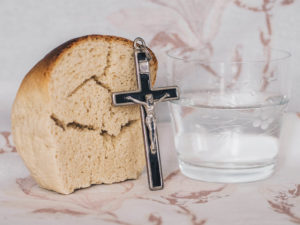Spirited Reflection: Lent, Human Identity and our Environment

In pondering Eve’s conversation with the serpent (as in Genesis) and Jesus’ conversation with Satan when he fasted for forty days in the desert (as in Matthew 4:1-11), we see these conversations as saying something about our human identity.
In part of Jesus’ conversation, he is invited to think about a world which is all about consumption. In that world we people are primarily consumers. Jesus is hungry and –wouldn’t it be nice to have some fast food, a Big Mac and a basket of fries? “You’ve got the means to satisfy your hunger,” says the Devil, “turn these stones into bread – you know you can do it!” We can do it too. In our world we have the means to turn the money in our pockets into a quick fix for our hunger. Whether or not we like fast food, we consider the ability to be consumers means we can buy what we want, when we want. We also believe that this is good for the economy. It is commonly assumed that the health of our economies depends on hearty consumer spending; and we participate enthusiastically, buying the latest in fast and packaged foods, clothing and furniture, cell phones, cars.
Lent invites us to stop and think about our identity as consumers. Jesus suggests that, first and foremost, we are not simply consumers: “We do not live by bread alone”. And as we stop to think about this, various issues arise. There are the obvious issues of the waste produced by over-consumption, the effect on the environment, over-flowing closets, basements and garages. There are also some related cultural and ideological issues that become exceedingly complex and sometimes conflicted.
One such issue in Canada right now is the very challenging dilemma of the development of our natural resources and the recent blockades disrupting our national railway system. Most of us have already made our quick assessment of this situation and set ourselves firmly on one side or the other. There is plenty of good material for rationalizing a position on either side. It makes good moral sense to choose a position based on the “rule of law.” But it also makes good moral sense to make a choice based on “Indigenous rights” which have been neglected and abused for centuries. As we work on solving this dilemma, there will likely be some “give and take” on all sides. The conflicting positions will need to be acknowledged and satisfied to some degree with a view to reaching a compromise that will allow us to carry on with business as usual. Is this not the Canadian way?
Again, we do not live by bread alone—Perhaps this Lenten realization will challenge us to think more deeply about our essential humanity and what might happen if we switched our focus from being relentless consumers to humble humans living with genuine respect in creation. For the time being we have limited choices in carrying on with the world as we know it; we are still dependent on a fossil fuel economy, we fuel our cars with gasoline, we heat our homes with gas. We need to manage our economy, including our own Canadian fossil fuel resources, as responsibly as possible. Jesus spent 40 days abstaining from any sort of consumption. Maybe we can spend 40 days thinking and praying about healthy alternatives to our consumers’ status quo.
Friends, we are not simply consumers, couch potatoes and tyrants; we are the faithful, created in the image of God, living with respect in creation, loving and serving others, seeking justice and resisting evil; thereby in our daily living, proclaiming Jesus crucified and risen.
An excerpt from a sermon March 1, 2020 by Hans van Nie, a seasoned United Church Minister serving at Royal York Road United Church in Toronto. His education in Religious Studies, Music and Scripture Studies led him to teaching in a small divinity school in Kenya for several years. Upon returning to Canada and following ordination, Hans served congregations in Maritime Conference, Hamilton Conference, and Toronto Conference. Over the years, Hans has maintained a connection with global ministries, has also been a member/investor in the global banking cooperative Oikocredit, serving on its International Members’ Council.








